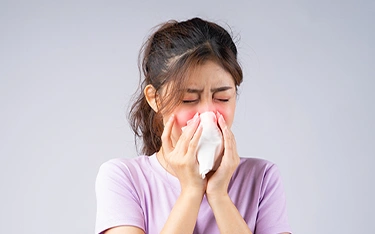FAQs
Allergic rhinitis is triggered by allergens like pollen or dust, while non-allergic rhinitis stems from irritants such as perfumes or weather changes. Though both types cause similar symptoms like sneezing or congestion, their underlying causes and immune responses are different.
Yes, homeopathy treats both types by calming the body’s response to allergens and reducing irritation from non-allergic triggers. It strengthens immunity and offers long-term relief by targeting the root cause rather than just masking the symptoms.
If symptoms occur seasonally or after exposure to dust or pollen, it’s likely allergic. If they flare with strong smells, weather, or pollution, it may be non-allergic. A doctor can help confirm through a detailed history and diagnostic tests.
Yes, allergic rhinitis often runs in families. It is caused by an inherited tendency for the immune system to overreact to harmless allergens, making it more common in individuals with a family history of allergies or asthma.
No, they are distinct conditions. However, a person may suffer from both simultaneously—a condition known as mixed rhinitis. Proper evaluation is important to identify the type and choose an appropriate treatment plan.
Yes, both can become chronic if not treated properly. Repeated exposure to triggers and untreated inflammation may cause symptoms to persist or worsen over time, affecting daily life and overall health.
Avoid triggers like dust, smoke, or strong odours. Keep your home clean, use indoor plants for natural air filtering, eat immunity-boosting foods, and follow a personalised treatment plan under medical guidance for best results.
Yes. Around 20% of Indians suffer from allergic rhinitis, especially in urban areas where pollution levels are high. Common triggers include pollen, dust mites, and air pollutants like PM2.5.
While a complete cure may not be possible, long-term control is achievable. With regular homeopathic care, symptom frequency and intensity can reduce significantly, improving overall well-being and quality of life.
Yes, air pollutants like smoke, dust, and PM2.5 particles can irritate nasal passages, worsening symptoms in both allergic and non-allergic rhinitis. Managing exposure and seeking proper treatment is key to controlling flare-ups.




